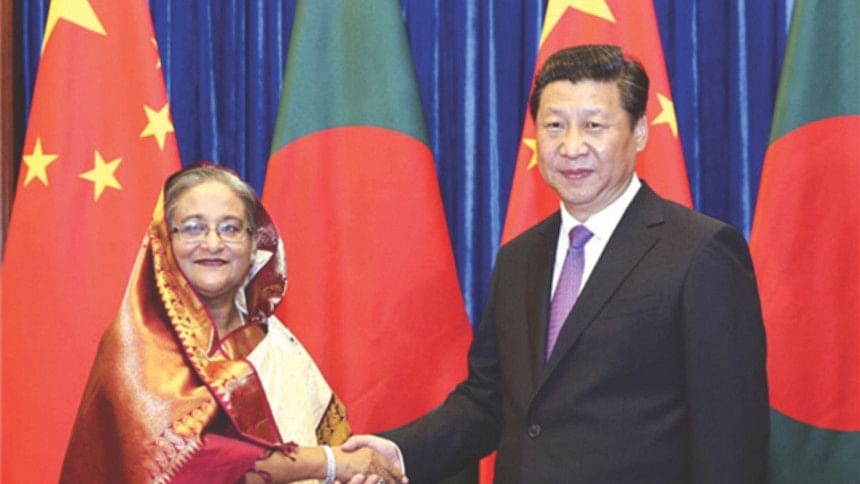What next?

The year 2015 marks the 40th anniversary of the establishment of diplomatic ties between Bangladesh and China. In the past four decades China-Bangladesh relations have undergone a speedy transformation. Trade between the two countries has grown rapidly, making China Bangladesh's largest trading partner, with the two-way trade accounting for about $12 billion in 2014. While Mainland Chinese investment in Bangladesh is still low, China is fast becoming an important partner in developing the latter's physical infrastructure.
Another crucial development has been the two nations' security and military relations. China has become the largest supplier of military hardware to Bangladesh. In fact, Dhaka-Beijing security relations are no less important than their economic ties. Greater cooperation between the two countries means Bangladesh hedges its security risks amid the presence of major powers in the region.
Both Beijing and Dhaka are great believers of regional cooperation. They have a consensus to connect East and Southeast Asia with South Asia under the aegis of the BCIM Economic Corridor involving Bangladesh, China, India and Myanmar.
The growing bilateral ties between China and Bangladesh in the past four decades have largely benefited both nations. However, Dhaka-Beijing relations face significant challenges, particularly from a security perspective. China also faces competition in the Bay of Bengal (BoB) from certain regional and global powers while making strategic investments. Japan, for instance, under the Abe government, is very active in developing energy and other infrastructure in BoB. Competing interests in developing strategic projects pose a huge dilemma for Dhaka. The fate of the proposed deep sea port project in Sonadia, Cox's Bazar, which could serve the interest of not only Bangladesh but also its vast hinterland in the neighbourhood, remains uncertain owing to the geo-political rivalry of regional and global powers. The current plan to shift the site for a deep sea port might result in sub-optimal outcome for the economy. A consortium involving concerning parties to develop a deep sea port in Sonadia is the only way forward.
Again, while China has taken marked strides with its flagship project 'One Belt, One Road (OBOR)' in Central Asia, Pakistan and some other parts of the world, it faces difficulties in implementing the plan in some areas of South Asia.
Geo-political factors also prevent Bangladesh from procuring some strategic military hardware, including submarines, from China. Dhaka's diplomatic apparatus has been less than successful in dealing with these issues, eventually sacrificing national interests.
Going forward, China-Bangladesh's economic ties, mostly dominated by trade, could continue to drive their bilateral relations. In the last five years, imports from China grew at about 20 percent and exports growth averaged at 40 percent. A back-of-the-envelope calculation, considering a moderate exports and imports growth scenario, indicates that China-Bangladesh trade could reach $30 billion by 2020.
In moving China-Bangladesh trade relations forward, the key challenge is to increase exports from Bangladesh. Beijing should relax market access terms, such as rules of origin for Bangladeshi products, and the latter should diversify its exports basket to access trillions of dollars worth Chinese consumer markets.
The next big thing to watch out for is the two countries' investment relations. Given Bangladesh's steady economic growth and urbanisation, the country needs to develop huge infrastructure. Globally, China is now the second largest source of outward investment and is projected to become the biggest source by 2020. Moreover, as China's wage level rises, it makes a lot of economic sense to relocate some labour intensive sunset industries to Bangladesh. Two economic zones in Chittagong and Dhaka, established exclusively for Chinese investors, is an appropriate step in this regard.
Financial cooperation between Beijing and Dhaka is likely to add a new dimension to the economic ties between the two countries. China's ambitious plan to internationalise its currency could help Bangladesh conduct a portion of trade in Renminbi (RMB) and secure some reserves in RMB-denominated assets, thus hedging currency risks. Beijing's ongoing initiatives to set up new financial institutions, such as the Asian Infrastructure Investment Bank, could open new opportunities for Bangladesh in accessing funds for infrastructure development.
Dhaka also intends to develop an ocean economy in the world's largest bay. To expedite the plan, it has to engage with technologically and financially sound partners like China, Japan, the United States and South Korea, among others. Coincidently, Beijing has taken up the OBOR initiative to revive the ancient Silk Road connecting the country with Central Asia, Europe, Africa, Middle East, Southeast Asia and South Asia. This multi-billion dollar infrastructure and economic zones development scheme is seen as the largest investment project after the United States' Marshall Plan, which was adopted to reconstruct Europe following WWII. China has invested $40 billion in the Silk Road infrastructure fund.
To sum up, Dhaka-Beijing ties, largely driven by trade and investment, could become the most important economic relation from Bangladesh's perspective. However, the bilateral ties between the two nations could face more challenges in years to come. The diplomacy of Bangladesh could be tested further in managing the country's relations with regional and global powers. Regionally, Dhaka needs to have a balanced relation, particularly with New Delhi and Beijing. Globally, Bangladesh has to ensure that it does not face a situation where Dhaka has to take a side between Beijing and Washington.
To help developing Bangladesh's strategic infrastructure and to manage the security challenges, Beijing's role should be markedly different from the role it played in other parts of South Asia. China should find a way to assure other powers that its interests in Bangladesh are largely driven by economics. Dhaka too needs to convince other powers that it is no Colombo or Islamabad when dealing with Beijing.
The writer is an economist.
Email: [email protected]

 For all latest news, follow The Daily Star's Google News channel.
For all latest news, follow The Daily Star's Google News channel. 



Comments